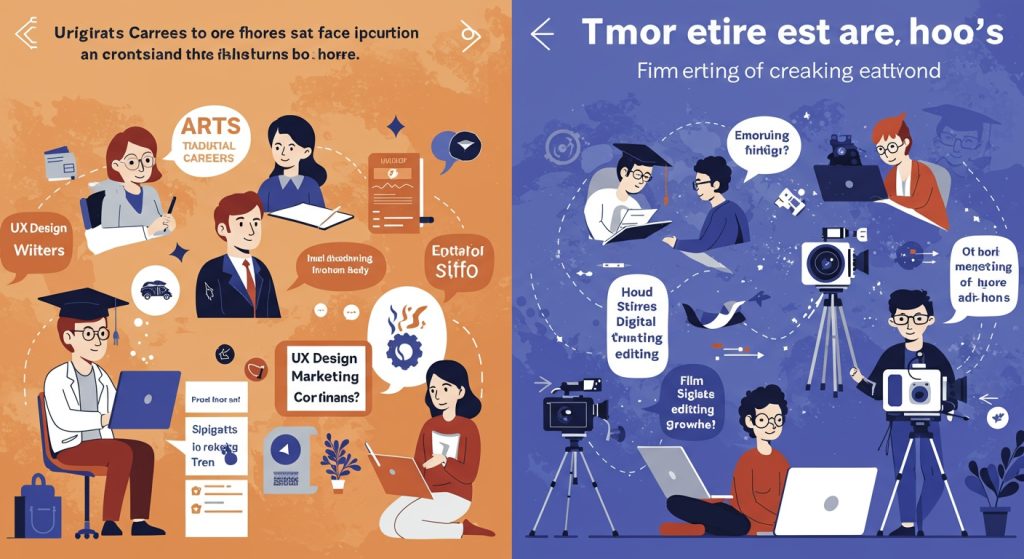Navigating university admissions today demands more than selecting a prestigious institution; it requires a precise strategic alignment between academic modules and future career trajectories. As the global economy pivots towards highly specialized roles, exemplified by the surge in AI Ethics specialists or Quantum Computing engineers, a general Computer Science degree might prove less direct than one specifically emphasizing advanced algorithms and data structures. For instance, aspiring Bioinformaticians must consider programs integrating biology with computational methods, rather than broad life sciences. Understanding how specific course choices, from advanced econometrics for financial modeling to sustainable development modules for ESG consulting, directly sculpt professional opportunities becomes paramount in a landscape increasingly valuing niche expertise and interdisciplinary proficiency.

Understanding Strategic Admissions
When you think about university, it’s often seen as a place to gain knowledge and broaden horizons. But, a truly strategic approach to higher education goes far beyond just earning a degree. Strategic admissions is about making deliberate choices about your university, your major. Even specific courses, with a clear vision of your desired career path. It’s about recognizing that the academic journey is a powerful launchpad. The decisions made during this period can profoundly shape your professional future. Gone are the days when a generic “Arts” or “Science” degree was sufficient for most career aspirations. Today’s job market is increasingly specialized, demanding particular skill sets and knowledge. Therefore, understanding how your course choices directly impact the competencies you develop. Subsequently the career doors that open (or close), is paramount. This isn’t just about picking a major; it’s about curating an educational experience that aligns precisely with your long-term ambitions, offering a competitive edge in a crowded marketplace. It’s a fundamental aspect of effective Career Guidance.
The Core Connection: Courses and Competencies
Every course you take in university is designed to impart specific knowledge and develop particular skills. These skills, whether they are analytical, creative, technical, or interpersonal, are the building blocks of your professional competency. Understanding this direct link is crucial for strategic course selection.
- Foundational Courses: These are typically introductory courses in a discipline that provide a broad understanding of the subject matter. For instance, an “Introduction to Psychology” course lays the groundwork for understanding human behavior, which is essential for fields like counseling, human resources, or marketing.
- Specialized Courses: As you progress, courses become more focused, delving deeper into specific sub-disciplines. A student in computer science might take “Data Structures and Algorithms,” which are critical for software development, or “Network Security,” vital for a cybersecurity role. These courses provide the specific technical skills required for niche roles.
- Elective Courses: Often overlooked, electives offer a unique opportunity to either broaden your skillset or deepen your specialization. A business student taking an elective in “Public Speaking” enhances their presentation skills, while an engineering student taking “Sustainable Design” might pivot towards eco-friendly solutions in their field.
The competencies gained from these courses directly correlate with the demands of various industries. For example, a student who excels in courses requiring extensive research and critical analysis (common in humanities) develops strong problem-solving and communication skills, highly valued in consulting or legal professions. Conversely, a student focused on laboratory-based science courses builds precision, data analysis. Experimental design skills, essential for research and development roles.
Navigating Different Career Clusters
Different university programs naturally lead to distinct career clusters, each with its own set of required skills and knowledge. Let’s explore how specific course choices within these clusters can fine-tune your path.
STEM Fields: Precision in Course Selection
STEM (Science, Technology, Engineering. Mathematics) fields are often perceived as having clear career paths. Even within them, course choices dictate specialization. Consider the broad field of computer science:
| Course Focus Area | Typical Courses | Key Competencies Developed | Specific Career Paths Impacted |
|---|---|---|---|
| Artificial Intelligence & Machine Learning | Machine Learning, Deep Learning, Natural Language Processing, Data Mining | Algorithm design, statistical modeling, data analysis, predictive analytics | AI Engineer, Machine Learning Scientist, Data Scientist, Research Scientist |
| Cybersecurity | Network Security, Cryptography, Ethical Hacking, Digital Forensics | Threat analysis, penetration testing, security architecture, incident response | Cybersecurity Analyst, Security Engineer, Penetration Tester, Forensics Investigator |
| Software Development | Data Structures, Algorithms, Software Engineering, Web Development Frameworks | Coding proficiency, system design, debugging, agile development methodologies | Software Engineer, Web Developer, Mobile App Developer, DevOps Engineer |
As you can see, even within a single major like Computer Science, the specific courses you choose (especially electives and advanced topics) will heavily influence whether you become an AI expert, a cybersecurity specialist, or a full-stack developer. This level of granular choice requires thoughtful Career Guidance and self-assessment.
Arts & Humanities: Beyond General Knowledge
There’s a common misconception that Arts and Humanities degrees don’t lead to specific career paths. But, these disciplines cultivate highly transferable and sought-after skills that are crucial in many professions. The key is understanding how to articulate and apply these skills.
Example Case Study: From English Literature to UX Writing
Sarah pursued an English Literature degree, taking courses in narrative theory, rhetoric. Creative writing. Initially, she worried about direct career paths. But, through strategic internships in content creation and marketing, she realized the power of her analytical, communication. Storytelling skills. Her deep understanding of language, audience. Persuasive writing, honed through literary analysis, made her an ideal candidate for a UX Writer role. This field requires crafting clear, concise. User-friendly language for digital products, a skill set directly derived from her humanities coursework. She now works for a major tech company, demonstrating how foundational academic skills can be reframed for modern roles. Courses in History develop critical research, source analysis. Historical context skills, valuable for policy analysis, journalism, or archival work. Philosophy courses cultivate rigorous logical thinking, ethical reasoning. Argumentation, making them excellent foundations for law, public policy, or even business ethics roles. The “soft skills” developed – critical thinking, communication, problem-solving, empathy – are increasingly recognized as essential across all industries.
Business & Economics: Tailoring Your Expertise
A “Business” degree is often an umbrella term for a multitude of specializations. The courses you select within a business school program will define your specific career trajectory.
- Finance: Courses like “Investment Analysis,” “Corporate Finance,” and “Financial Modeling” prepare students for roles in investment banking, portfolio management, financial analysis, or corporate treasury. Certifications like the CFA (Chartered Financial Analyst) often build upon this academic foundation.
- Marketing: “Consumer Behavior,” “Digital Marketing Analytics,” “Brand Management,” and “Marketing Research” are crucial for careers in advertising, market research, product management, or social media strategy. Practical projects involving real-world campaigns are often integrated.
- Human Resources: “Organizational Behavior,” “Talent Acquisition,” “Compensation & Benefits,” and “Labor Relations” lead to roles in HR management, recruitment, training and development, or employee relations.
- Supply Chain Management: Courses in “Logistics,” “Operations Management,” “Global Supply Chains,” and “Inventory Management” are vital for careers in logistics, procurement. Operations, ensuring the efficient flow of goods and services.
The strategic choice of major and specific electives within a business program allows for deep specialization that aligns with the demands of particular industries, from Wall Street to Silicon Valley.
Healthcare Professions: A Highly Structured Path
Healthcare is perhaps one of the most structured career paths, with very specific course requirements and sequences.
- Pre-Med/Medical School: This typically requires a strong foundation in biology, chemistry (general and organic), physics. Often biochemistry. Specific lab components are usually mandatory. Beyond these core sciences, courses in humanities or social sciences are often encouraged to develop empathy and communication skills. The MCAT exam is heavily based on these foundational science courses.
- Nursing: Nursing programs have a specific curriculum that includes anatomy, physiology, pharmacology, microbiology. Clinical rotations. These courses directly prepare students for the NCLEX examination and hands-on patient care roles.
- Public Health: While still in healthcare, public health degrees focus on epidemiology, biostatistics, health policy. Environmental health. These courses prepare individuals for roles in health promotion, disease prevention. Policy analysis at a community or governmental level, distinct from direct patient care.
In healthcare, the prerequisites and course sequence are often non-negotiable. Deviations can significantly impact eligibility for professional programs or licensure. Therefore, meticulous Career Guidance is essential from the outset.
The Role of Electives, Minors. Internships
While your major forms the backbone of your academic profile, electives, minors. Internships are powerful tools for fine-tuning your career trajectory and enhancing your employability.
- Electives: Don’t view electives as filler courses. They are opportunities to:
- Deepen Specialization: If you’re a Computer Science major interested in game development, taking an elective in 3D modeling or interactive narrative design can give you a significant edge.
- Broaden Skill Sets: A STEM student taking a public speaking or creative writing elective can dramatically improve their communication skills, which are vital for leadership roles. Similarly, a humanities student taking an introductory coding course can open doors to tech-adjacent roles.
- Explore New Interests: Sometimes, an elective can spark a passion you never knew you had, potentially leading to a career pivot or a valuable secondary skill.
- Minors: A minor is a secondary concentration that provides a deeper dive into a specific subject than just a few electives. A minor can:
- Complement Your Major: An Engineering major with a minor in Business can pursue project management or entrepreneurial roles. A Psychology major with a minor in Data Science can become a valuable asset in user research or behavioral analytics.
- Signal Diverse Skills: A minor demonstrates a commitment to learning beyond your primary field, making you a more versatile candidate.
- Internships: Perhaps the most impactful non-course component, internships provide real-world experience. They allow you to:
- Apply Classroom Knowledge: Test theories and skills learned in your courses in a practical setting.
- Gain Industry Insights: interpret the day-to-day realities of a profession and determine if it aligns with your expectations.
- Build a Professional Network: Connect with industry professionals who can offer mentorship, job leads. Recommendations.
- Strengthen Your Resume: Practical experience is often as valuable as academic credentials, if not more so, for entry-level positions.
Actionable Strategies for Prospective Students
Making strategic university course choices requires proactive planning and continuous self-assessment. Here are actionable steps you can take:
- Research Your Desired Career Paths Extensively: Don’t just pick a major because it sounds good. Look up job descriptions for roles you aspire to. What skills are consistently listed? What educational backgrounds are preferred? For example, if you dream of being a UX Designer, you’ll notice many roles ask for psychology, human-computer interaction, or graphic design backgrounds.
- Utilize University Career Guidance Services Early: Most universities have dedicated career centers. Don’t wait until your senior year! Engage with them from day one. They can offer aptitude tests, resume workshops, mock interviews. Connect you with alumni in various fields. Their expertise in Career Guidance is invaluable.
- Conduct Informational Interviews: Reach out to professionals working in fields that interest you. Ask them about their daily tasks, what they like/dislike about their job. Crucially, what academic background and skills they found most beneficial. LinkedIn is an excellent tool for this.
- Consider Interdisciplinary Programs: Many modern problems require solutions that cross traditional academic boundaries. Look for programs that combine fields, such as “Biomedical Engineering,” “Environmental Policy,” or “Digital Humanities.” These can offer unique skill sets highly valued by employers.
- Embrace Adaptability and Lifelong Learning: The job market is constantly evolving. While strategic planning is key, also cultivate a mindset of continuous learning and adaptability. Your first career choice might not be your last. The ability to learn new skills will be your greatest asset.
Pitfalls to Avoid
Even with the best intentions, students can fall into common traps when making university course decisions. Being aware of these can help you steer clear.
- Choosing a Major Based Solely on Parental or Peer Pressure: While advice from family and friends is valuable, your academic and career path must ultimately resonate with your own interests and strengths. Forcing yourself into a highly competitive field like medicine or law if your passion lies elsewhere can lead to burnout and dissatisfaction.
- Ignoring Personal Interests and Strengths: A course of study that doesn’t align with your innate curiosities or natural aptitudes will be a struggle. You are more likely to excel and find fulfillment in areas where you have genuine interest and talent. Self-reflection is as crucial as market research.
- Not Exploring Diverse Career Paths Within a Field: A common mistake is to assume a major leads to only one or two specific jobs. For example, an English major isn’t just for teaching; it can lead to content creation, marketing, technical writing, law, or public relations. Broaden your understanding of potential applications.
- Underestimating the Value of Soft Skills: While technical skills are vital, employers consistently rank communication, teamwork, problem-solving, adaptability. Critical thinking (soft skills) as equally, if not more, essential. Ensure your course choices and extracurricular activities help cultivate these.
- Failing to Consider Practical Experience: Relying solely on classroom learning without seeking internships, part-time jobs, or volunteer opportunities relevant to your field is a significant oversight. Practical experience bridges the gap between theory and application, making you a much more attractive candidate.
Conclusion
Ultimately, your university course choice is less about the degree title and more about the skills and adaptive mindset you cultivate. I’ve personally advised students who, by strategically combining disciplines—like a minor in computational linguistics with a psychology major—unlocked opportunities in fields like AI ethics, a rapidly emerging area. This foresight is crucial, as current trends show industries, from sustainable engineering to digital marketing, increasingly demand hybrid skillsets that transcend traditional academic silos. Therefore, don’t merely select a program; proactively research how evolving job markets are reshaping roles. Engage with professionals for authentic insights, understanding that soft skills like critical thinking and problem-solving are as vital as technical expertise. Your academic journey is a dynamic blueprint, not a rigid map. Embrace the flexibility, stay perpetually curious. Actively sculpt your educational experience to align with a continuously evolving professional landscape. The future truly belongs to those who plan strategically and adapt decisively.
More Articles
Top Academic Pathways: Discovering the Best Courses for Direct University Entry
The Future of Learning: Key Trends Shaping Public University Curricula by 2025
Beyond the Classroom: Uncovering Experiential Learning Opportunities at Public Universities
Top Undergraduate Programs: Exploring Popular Courses and Degrees at State Universities
Your Complete Guide: How to Successfully Apply for Direct University Admission
FAQs
How do my university subject choices really affect my job prospects later on?
Your university course choices can significantly impact your career path. Some degrees, like medicine or engineering, are direct prerequisites for specific professions. Other fields, like humanities or broader sciences, develop highly valued transferable skills but might require further specialization or work experience to land a very niche role.
Can you give me an example of a specific course leading directly to a career?
Absolutely! A degree in Civil Engineering directly prepares you for roles such as a Civil Engineer, designing and managing infrastructure projects. Similarly, a Law degree is the foundational step for becoming a lawyer. A Nursing degree leads straight into a nursing career.
What if I pick a broad degree, like Arts or Humanities? Does that limit my career options?
Not at all! While broad degrees don’t always point to one specific job title, they excel at developing critical thinking, research, communication. Analytical skills. These are incredibly valuable across many industries, including marketing, journalism, policy. Even tech. You might need to gain specific experience or pursue postgraduate study. You’ll have a lot of flexibility.
What if I start a degree and realize I want a different career path than I initially thought? Is it too late?
It’s rarely too late! Many people change their career direction after their first degree. Your initial studies will still have provided you with valuable skills. You might need to pursue further education, like a master’s or a vocational course, or gain relevant work experience through internships to pivot effectively. Flexibility is key!
How can I figure out which courses truly align with my dream job?
Start by researching your dream job thoroughly. Look at typical job descriptions on career sites to see what educational backgrounds are preferred or required. Talk to people already working in that field if you can. Also, check university course outlines and ‘career prospects’ sections – many universities list potential jobs their graduates go into for specific programs.
Are there general skills I can get from almost any degree that are helpful for my career?
Definitely! No matter what you study, you’ll likely develop highly sought-after transferable skills. These include critical thinking, problem-solving, effective communication (both written and verbal), research skills, time management. The ability to learn independently. These are invaluable in almost any professional setting.
How much do things like internships or extracurriculars matter compared to my actual course choice?
They matter a lot! While your course provides foundational knowledge, internships offer crucial practical experience and networking opportunities within your desired industry. Extracurricular activities, like joining clubs or volunteering, showcase leadership, teamwork. Commitment. Together, they create a much more well-rounded and appealing profile to potential employers than just your degree alone.



